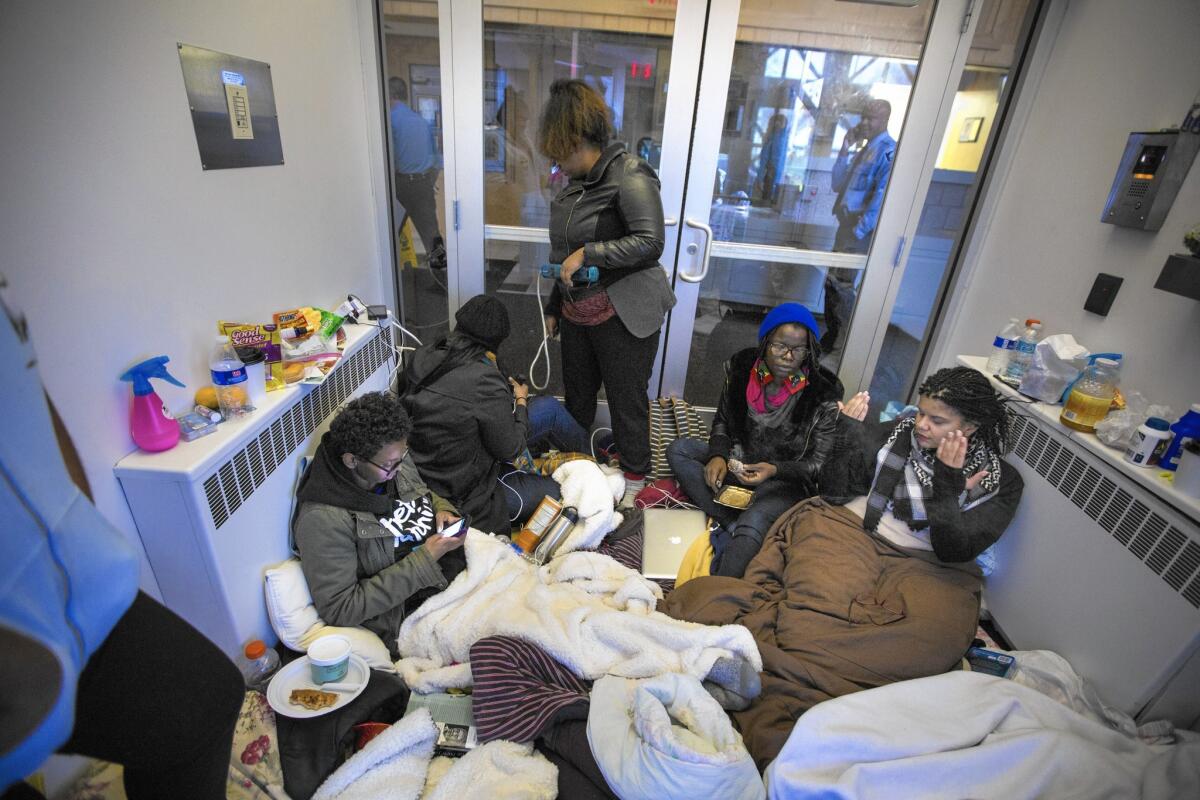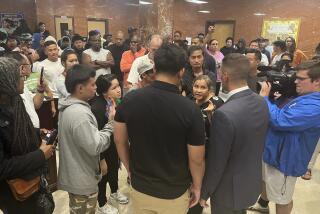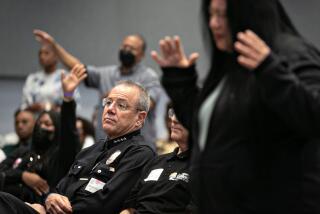Minneapolis mayor seeks federal investigation of police shooting

- Share via
reporting from MINNEAPOLIS — The mayor of Minneapolis said Monday that she has requested a federal civil rights investigation into the weekend shooting of a black man by a police officer during an apparent struggle.
Mayor Betsy Hodges said she sent an email to the Civil Rights Division of the Department of Justice and to the U.S. attorney for Minnesota to ask for a civil rights investigation in the “interest of transparency and community confidence.” The state’s Bureau of Criminal Apprehension is already conducting a criminal investigation, but Hodges said the city needs “all the tools we have available to us.”
Authorities have released few details about the shooting, which enraged some community members after witnesses said the man was handcuffed when he was shot. Police said their initial information showed the man, a suspect in an assault, was not handcuffed. The incident sparked protests and an overnight encampment at a police precinct on the city’s north side. Community members and activists called for a federal investigation, as well as for authorities to release video of the incident and the officer’s identity.
Two officers are on paid leave, standard practice after such an incident. Police Chief Janee Harteau said the officers were not wearing body cameras. When asked if squad car video was available, she said that it was part of the investigation.
Nekima Levy-Pounds, president of the Minneapolis chapter of the NAACP, said the request for a federal investigation is a step in the right direction, “given that we do not trust Minnesota law enforcement officials to hold themselves accountable.”
Police initially said they were called to north Minneapolis around 12:45 a.m. Sunday in response to a reported assault. When they arrived, a man was interfering with paramedics who were assisting the victim, police said. Officers tried to calm him, but there was a struggle. At some point, an officer fired at least once, hitting the man, police said.
Authorities have not released the man’s name, but family members identified him as Jamar Clark, 24, and said he was on life support. His father, James Hill, said Clark suffered a single gunshot wound over his left eye.
“None of our children deserve to be shot and killed, and then talked about like they are animals,” Bettie Smith, whose son Quincy Smith died in a 2008 confrontation with police, said at a news conference outside the precinct.
Ramona Dohman, the commissioner of the Minnesota Department of Public Safety, said the officers’ identities would be released after investigators interview them. She said these types of investigations take time, and it’s hard to predict when authorities will have answers.
Harteau said she welcomed a federal investigation.
“Everyone involved needs and deserves the truth and the facts,” she said.
Gov. Mark Dayton also issued a statement saying he supported the request for a federal inquiry.
Community members began protesting Sunday afternoon, with some demonstrators camping at the police station overnight. Hodges and Harteau held a listening session with the community Sunday evening, during which some citizens shouted in anger. The protests continued through Monday.
Authorities said protesters broke a window at the precinct and also damaged two police vehicles, including a marked squad car in which all the windows and a camera were broken, and an expletive was scratched into the hood. One person was arrested in connection with damage to an unmarked police car.
The protests are just the latest expression of tension between the department and minorities in the city.
Outrage and a civil lawsuit followed the 2013 death of 22-year-old Terrance Franklin, a burglary suspect whom police pursued and shot in a Minneapolis basement. A grand jury declined to indict the officers involved.
In 2014, prominent civil rights activist Al Flowers said he was the victim of brutality when police served a warrant on a relative at his home. Police say Flowers instigated their aggression.
The rocky relations have led to discussions between police and minorities and the creation of task forces designed to quell concerns. A special civilian review authority was formed after the death of an elderly black couple during a botched drug raid decades ago.
This spring, Minneapolis was selected for a federal Justice Department program to rebuild trust between police and the communities they patrol.
KG Wilson, a peace activist who retired just weeks ago after 11 years of building relationships between the community and the police department, said he’s hurt by the reaction he is seeing and disagrees with the protests.
“I hate that this is going on right now,” he said. “My heart is so crushed.”
More to Read
Sign up for Essential California
The most important California stories and recommendations in your inbox every morning.
You may occasionally receive promotional content from the Los Angeles Times.













